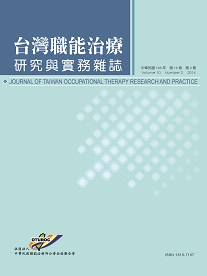Journal of Taiwan Occupational Therapy Research and Practice

半年刊,正常發行
目的:主觀認知衰退長者為失智高危險族群,會造成生活認知困擾。若對其認知問題、訓練目標與認知策略有初步了解,有助介入設計。已有研究支持認知策略訓練可改善日常功能,但於社區應用之可行性需探討。本研究探討於社區據點執行結合團體與個別執行模式之認知策略訓練之可行性;並蒐集認知相關日常目標及相對應策略。方法:單組前後測設計。共納入 22 位社區主觀認知衰退者。以改善認知性生活活動表現為目標。介入每次 1 小時,每週一次,共 8 週(六次團體、兩次個別)。以加拿大職能表現測驗收集認知目標與團體執行紀錄收集認知策略。以描述性統計分析可行性(招募率、保留率、滿意度等)、認知相關日常目標及策略。以配對樣本 t 檢定分析比較加拿大職能表現測驗前後測。結果:參與者年齡 68.55±7.02,77.27% 女性。可行性:73.33% 整體招募率,100% 保留率,85.80% 出席率;68.83% 回家功課完成率,22.73% 居家訪視接受率。加拿大職能表現測驗於表現(前測 6.83±1.57,後測 8.01±0.95,p = .001)及滿意度(前測 7.01 ±1.68,後測 8.20±1.01,p = .001)皆達顯著差異。每人設定 2 到 5 個目標,共蒐集 98 個目標,記憶力相關困擾最多。結論:認知策略訓練於社區主觀認知衰退長者可行性高,參與者滿意度高。未來研究可進一步驗證認知策略訓練的成效與追蹤長期效益。
Objectives: Older persons with subjective cognitive decline (SCD) are at high risk for dementia and experience cognitive-related functional difficulties. The knowledge of their cognitive goals and strategies will contribute to intervention design. Empirical evidence supports that cognitive strategy training (CST) improves functional performance. Further studies are needed to explore the feasibility of implementing CST in community settings. This study is to explore the feasibility of CST with a combined group-based and individual home-based interventions for community-dwelling older adults with SCD. We also described their cognitive goals and corresponding cognitive strategies. Methods: One-group pretest- posttest design. Twenty-two community-dwelling older adults with SCD were included in the analysis. The CST consisted of eight one-hour weekly sessions, six group-based and two individual-based. The primary goal is to improve cognitive-related functional performance. Canadian Occupational Performance Measure-Chinese version (COPM-C) was used to collect cognitive goals and group fieldnotes to record cognitive strategies. Feasibility data, including recruitment, retention, and satisfaction, were analyzed by descriptive statistics. Paired sample t-test was used to compare pre-post intervention COPM-C scores. Results: The participants aged 68.55± 7.02. 77.27% were women. Feasibility data showed a 73.33% recruitment rate, 100% retention, 85.80% attendance, 68.83% homework completion, and 22.73% home-visit acceptance. The COPM-C showed a significant difference (performance pre-test 6.83 ±1.57, post-test 8.01 ±0.95, p=.001; satisfaction pre-test 7.01 ±1.68, post-test 8.20 ±1.01, p=.001). Ninety-eight goals were collected, and the majority were related to memory. Conclusion: The findings support the feasibility of using CST in community-dwelling older adults with SCD. The participants were satisfied with the program. Further studies are recommended to examine the effectiveness of community-based CST and follow-up effects.












